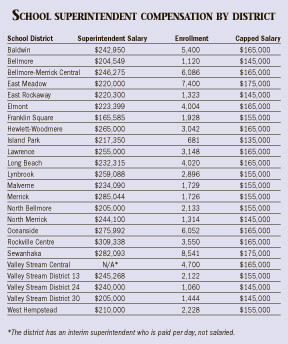Salary cap: a symbolic finger in the dike
Depending on your point of view, Governor Cuomo’s proposed superintendent salary cap is either a good start on the road to reining in exorbitant taxes across New York state or, at best, a symbolic gesture, akin to sticking your finger in a dam to plug a hole while ignoring the cracks spreading in all directions.
By itself, it’s a political gimmick, designed to give the appearance of decisive action.
Under the governor’s plan, superintendent salaries would be capped at between $125,000 and $175,000, depending on the number of students enrolled in a district. For many Long Island superintendents, that would mean taking a pay cut — for some, a significant one (see chart).
While capping our district leaders’ sometimes breathtakingly high salaries is a positive first step toward cutting expenses across the state, singling them out isn’t the answer to the tax woes facing us.
Cuomo’s plan would save an estimated $15 million statewide, which is really just a drop in the bucket given the state’s steadily growing $10 billion budget deficit. The real spending problem in the schools is the Triborough Amendment to the Taylor Law and school boards that can’t seem to say no to yearly salary increases.
The Taylor Law forbids strikes by public employee unions. Passed in part to make up for the negotiating leverage the unions lost when they lost the right to strike, the Triborough Amendment guarantees that expired union contracts are extended indefinitely while new contracts are in negotiation.
If a contract expires in which teachers are earning 3 percent increases per year, for example, they still earn those increases while negotiating a new contract. The law gives the unions too much leverage, since it removes any incentive for them to bargain with school districts trying to rein in spending.
Top that with state mandates dictating how much school districts must contribute to skyrocketing pension plans and health care costs, and you start to see just how little superintendents’ salaries really matter in the big picture.

 51.0°,
Mostly Cloudy
51.0°,
Mostly Cloudy 




